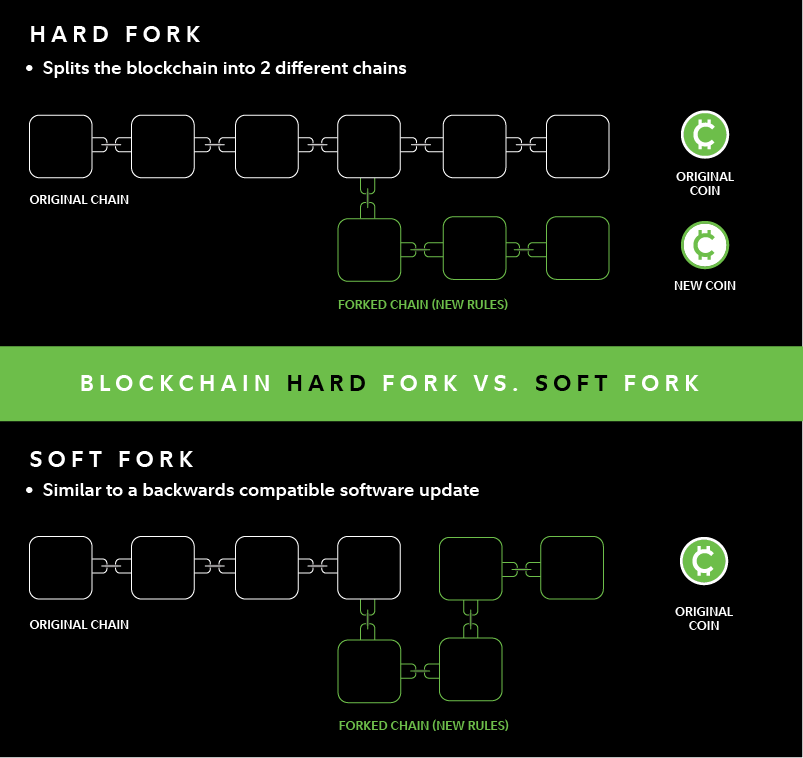Did you know that as of late 2023, there are technically over 70 active versions of the Bitcoin network? This is due to a blockchain function called forking, which has occurred over 100 times throughout Bitcoin's history.
So do you need to keep track of all 70 versions of Bitcoin? Let's answer this question by exploring how forks work.
What is a blockchain fork? Why do forks happen?
Let's look at an example. One critique of Bitcoin is that its transaction processing times can be slow. This is because its block size—the number of transactions processed per block—is kept small by design. Proponents of its block size believe that this helps keep Bitcoin decentralized, as larger block sizes require more expensive equipment to mine. Smaller block sizes make it possible for more miners to participate, which may help prevent large players from controlling the blockchain.
However, not everyone in the Bitcoin community agrees that its block size is necessary to ensure decentralization. In these situations, the community (i.e., bitcoin holders) can vote to execute a fork that splits the Bitcoin blockchain into 2 separate blockchains. One blockchain maintains the traditional block size, while a new one runs on larger block sizes. Both blockchains maintain the same history up to the time of the split (as in who owns how many cryptocurrencies and who has sent who how many), but operate independently.
As of late-November 2023, over 100 Bitcoin forks have occurred. However, many are now defunct because they were unable to generate enough interest from the larger community. In other words, the original Bitcoin blockchain is still the most popular.
With that said, 2 of the most successful forks still in existence are Bitcoin Cash (trading under $BCH) and Bitcoin Gold (trading under $BTG). Bitcoin Cash aims to become a faster, more efficient version of Bitcoin through larger block sizes. Bitcoin Gold runs on a modified proof-of-work system with the goal of becoming even more decentralized than Bitcoin.
Note that these 2 are both still significantly smaller in market cap compared to Bitcoin. Because forks run independently, what happens on these alternate chains does not affect Bitcoin. They do, however, attempt to be competitors, in that their goal is to replace Bitcoin. Nevertheless, it's not necessarily critical for Bitcoin holders to monitor them since they're so far behind in market cap.
While we've used Bitcoin as our example here, forks can happen on any blockchain. We'll cover a few more examples later.

What is a hard fork?
A hard fork occurs when a blockchain splits into 2 blockchains, with each operating independently. The Bitcoin examples we just discussed were hard forks.
This contrasts with a soft fork, where the blockchain simply modifies its rules—no splitting required. Typically, with soft forks, the entire community accepts the new rules, whereas a hard fork often splits the community into 2 factions.
Hard fork vs. soft fork
Hard forks are more drastic in nature. They typically stem from either a disagreement between 2 schools of thought, or as a defense against a hack. In the latter instance, hard forks essentially reset the blockchain ledger by creating a new ledger that starts at a point in time before the hack happened.
In both cases, the split creates a new cryptocurrency. And if it occurred due to a disagreement in the community, the new cryptocurrency may be seen as a competitor to the original. Soft forks, on the other hand, are often comparatively minor upgrades. They're typically system upgrades, similar to how your laptop installs updates, and are often accepted by the majority of the community.
It's worth noting that hard forks may come with more security issues. For example, a split can open both blockchains up to replay attacks, where a cybercriminal duplicates a transaction on one blockchain to the other, allowing them to receive twice the proceeds from a single transaction.
The Ethereum fork
One of the most high-profile forks in crypto history occurred on the Ethereum network. In 2016, a DAO (decentralized autonomous organization)1 built on Ethereum was hacked for $60 million. DAOs are like decentralized crowdfunding platforms: People from anywhere in the world can donate to a specific cause defined by the DAO.
To neutralize the hack, the Ethereum community voted to execute a hard fork, splitting the blockchain into 2 chains: Ethereum ($ETH) and Ethereum Classic ($ETC). The former essentially reset the ledger to a point before the attack, reimbursing stolen funds to DAO investors in $ETH. The latter, Ethereum Classic ($ETC), was abandoned by most of the community.
Because new tokens resulting from forks are distributed via wallet address, the community was able to blacklist the hackers' wallets from receiving $ETH. Also, because of the fork, the tokens the hackers stole became $ETC tokens. Since most of the community had switched to $ETH, $ETC quickly became less valuable.
What does a fork mean for crypto investors?
Hard forks often produce new tokens, but investors should remember that they're not guaranteed to be valuable, and many may eventually be worthless. While the $ETH token created from the Ethereum hard fork has been successful, remember that so far, none of Bitcoin's more than 100 hard forks have overtaken the original in market cap.
Note that blockchains resulting from hard forks run independently. If a cryptocurrency you own is forked, the resulting tokens may attempt to compete with each other. However, what happens on one generally does not affect the other, unless there's a cyberattack.
And as always, crypto and crypto-related assets may generally be more susceptible to market manipulation than securities. Crypto holders don't benefit from the same regulatory protections applicable to registered securities, and the future regulatory environment for crypto is currently uncertain.
Crypto is not insured by the Federal Deposit Insurance Corporation (FDIC) or the Securities Investor Protection Corporation (SIPC). Considering these factors, limit any crypto purchases to a size you're comfortable with losing.


